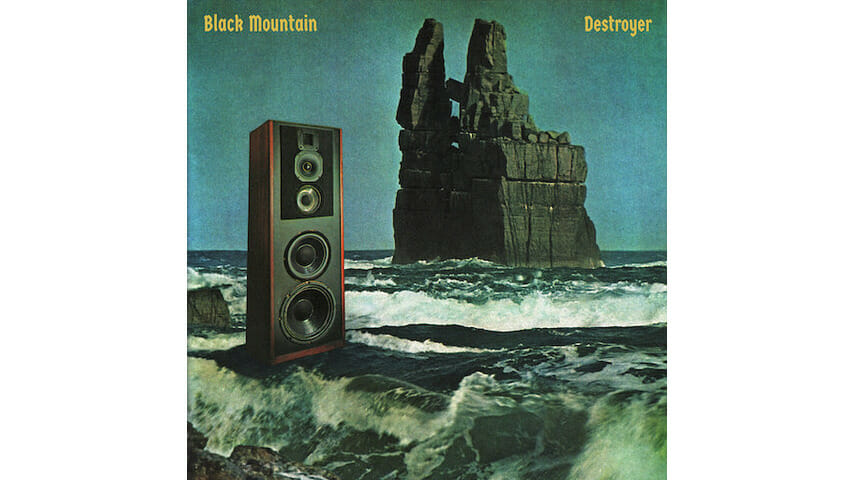
Part of the fun of listening to a new album is playing detective with the music; each chord a clue, each lyric a key, to arriving at the truth of the record. But often the truth is just what we find and not what’s actually there. Case in point: Destroyer, the latest treasure from Canadian psych rock outfit Black Mountain, a heavy, crunchy, head-banging good time with eight tracks to throw the sign of the horns to. “Future Shade.” “Horns Arising.” “Licensed To Drive.” “High Rise.” For any self-respecting rocker, the album’s a treat, but resisting the interpretive urge is impossible. What kind of apocalypse is Stephen McBean warning us of?
He isn’t, it turns out. He’s just singing about getting his driver’s license back in 2017 and paying tribute to his car. Once that nugget of info’s settled in your brain, all visions of chaos implied by the word “destroy” come to a halt with the harsh cacophony of brakes screeching. Such is the mundanity of the album’s creative genesis.
But there’s beauty in mundanity, as well as nostalgia. Not the kind artists lean on to make art through liberal appropriation of others’ work, but the honest kind that fuels imagination. Destroyer’s nostalgia is personal. Granted, 2017 isn’t that far in the past, but for McBean it’s an important life marker, and even something as seemingly trivial as acquiring a driver’s license is worth celebrating with fuzzy, distorted, thoroughly wicked rock ‘n roll. Destroyer starts thumping with the first track and never stops; the tone might change, but the listener’s desire to stomp the accelerator on the open road won’t.
Grant that Destroyer bears the hallmark of Black Mountain’s true or presumed influences. One song to the next recalls bits and pieces of Black Sabbath, AC/DC, Pink Floyd, even a little Metallica, but there’s never a moment where the line between “influence” and “imitation” is crossed. Black Mountain follows in their idols’ footsteps not by shamelessly lifting their sounds, but by folding those sounds into their personal aesthetic. You’ll hear Sabbath because Black Mountain like the band, not because they heard “Iron Man” and thought it’d be a good idea to straight-up copy it for their own ends. Destroyer is such a specific work, a work so intrinsically tied to a touchstone in McBean’s life (however delayed), that it avoids plagiarism by proximity to its source.
It helps, of course, that the record combusts the instant “Future Shade” begins pumping through the speakers. Most teens dream of being rewarded for making it to 16 with the right to drive. Among those teens, a healthy percentage probably also dream of getting on stage and striking snarling power chords as the gathered masses writhe and stomp about. “Future Shade” joins these two separate adolescent fantasies like a hinge, a superb marriage between the desire for the personal freedom a car accords and the desire to wow a crowd with muscular, sweaty hard rock. The song, and the album writ large, recreates teenhood’s optimistic, anarchic glory days for listeners instead of simply telling of those days. Fittingly, it’s transportational.
But Destroyer isn’t all thrashing riffs and speedy arrangements. “Future Shade” gives way to “Horns Arising,” a downtempo tune as metal-adjacent as the album gets (“Horns arising / on a lake of fire” ), then picks up the pace all over again with the space rock-infused “High Rise” before shifting into the lilting, trippy “Pretty Little Lazies,” a title that proudly advertises the song’s sonic qualities. Think of those pivots as an acknowledgment of Black Mountain’s varied inspirations and a surrender to the many ways a road trip playlist can be written: Velocity’s good, but it’s nice to slow things down occasionally to better appreciate the journey.
That’s a lot to say for an album structured around the one of the most basic teenage rites of passage. Maybe, as they evolve into adults, they forget what having a license represents, and what the jolt of getting behind the wheel for the first time feels like. Destroyer captures the exuberance of that milestone with motley style.
Boston-based culture writer Andy Crump has been writing about film and television online since 2009 (and music since 2018). You can follow him on Twitter and find his collected writing at his personal blog. He is composed of roughly 65% craft beer.